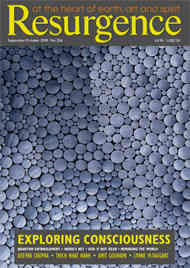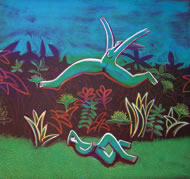The American writer Joan Didion once observed that we tell ourselves stories in order to live. Of all our stories, it is the scientific ones that most define us. Those stories create our perception of the universe and how it operates, and from this we shape all our societal structures: our relationships with each other and our environment, our methods of doing business and educating our young, of organising ourselves into towns and cities, of defining the borders of our countries and our planet.
Although we perceive science as an ultimate truth, it is ultimately just a story, told in instalments. We learn about our world in piecemeal fashion, a process of constant correction and revision. New chapters refine – and often supplant – the chapters that have come before.
Our current scientific story is more than 300 years old, a construction largely based on the discoveries of Isaac Newton, of a universe in which all matter is thought to move within three-dimensional space and time according to certain fixed laws. The Newtonian vision describes a reliable place inhabited by well-behaved and easily identifiable matter.
The worldview arising from these discoveries is also bolstered by the philosophical implications of Charles Darwin’s theory of evolution, with its suggestion that survival is available only to the ruggedly genetic individual.
These, in their essence, are stories that idealise separateness. From the moment we are born, we are told that for every winner there must be a loser. From that constricted vision we have fashioned our world.
IT IS NOW clear that the story we’ve been told is about to be replaced by a drastically revised version. Frontier research into the nature of human consciousness has recently upended everything that we have hitherto considered scientific certainty about our world.
This research tells a radically new scientific story. The latest chapter, written by a small group of frontier scientific explorers, suggests that at our essence, we exist as a unity, a relationship – utterly interdependent, the parts affecting the whole at every moment.
Dozens of scientists in prestigious areas around the world have demonstrated that all matter exists in a vast quantum web of connection and that an information transfer constantly carries on between living things and their environment. Still others have produced evidence suggesting that consciousness is a substance outside the confines of our body.
The brain and DNA, always assumed to be the body’s central conductors, should more properly be considered transducers – which transmit, receive from and ultimately interpret quantum information picked up from ‘The Field’.
Even our current understanding of time as flowing in a single direction has been exposed in orthodox circles as an incomplete human construct that may have to be drastically revised.
The most recent discoveries have unearthed extraordinary evidence that the strange concepts of quantum physics – once thought to govern only the world’s tiniest particles – in fact occur in the world at large. New discoveries about the mutable nature of atoms and molecules lend more weight to the idea, advanced by a number of these scientists, that consciousness may be central in shaping our world.
Every day, in their laboratories, these scientists catch a tiny glimmer of the possibilities suggested by their discoveries. They’ve found that human beings are something far more impressive than evolutionary happenstance or genetic survival machines. Their work suggests a decentralised but unified intelligence that is far grander and more exquisite than either Darwin or Newton could have imagined: a process that is not random or meaningless, but intelligent and purposeful. They’ve discovered that, in the dynamic flow of life, order triumphs.
The significance of these findings extends far beyond the validation of extrasensory powers or parapsychology. They threaten to demolish the entire edifice of present-day science. The recent discoveries of many scientists, that quantum effects occur in the world of the tangible, may well signal an end to the divide in modern physics between the laws of the large and the laws of the quantum particle, and the beginning of a single definition of all life.
Our definition of the physical universe as a collection of isolated objects, our definition of ourselves as just another of those objects, even our most basic understanding of time and space will have to be recast. Top scientists in academic centres of research around the world have demonstrated that an information transfer is constantly being carried on between living things and their environment, and that thought forms are simply another aspect of transmitted energy.
We can no longer view ourselves as isolated from our environment, or our thoughts as the private, self-contained workings of an individual brain. Dozens of scientists have produced thousands of papers in the scientific literature offering sound evidence that thoughts are capable of profoundly affecting all aspects of our lives. As both observers and creators, we are constantly remaking our world at every instant. Every thought we have, every judgment we hold, however unconscious, is having an effect. With every moment that it notices, the conscious mind is sending an intention.
These revelations force us not only to rethink what it is to be human, but also how to relate. We may have to reconsider the effect of every thought that we think, whether it is vocalised or not. Our relationship with the universe carries on, even in our silence.
WE WILL HAVE to reframe our understanding of our own biology in more miraculous terms. We are only just beginning to understand the vast and untapped human potential at our disposal: the individual’s extraordinary capacity to influence the world. This potential is every person’s birthright, not simply that of the gifted master.
If we could learn how to direct our potential for influence in a positive manner, we could then improve every aspect of our world. Medicine, healing, education, even our interaction with our technology would benefit from a greater comprehension of the mind’s involvement in its world. If we could begin to grasp the remarkable power of human consciousness, we would be able to advance our understanding of ourselves in all our complexity.
The new scientific story has heralded the end of dualism in every sense. Far from destroying God, science for the first time has begun to prove God’s existence – by demonstrating that a higher, collective consciousness is out there. There need no longer be two truths: the truth of science and the truth of religion. There can be one unified vision of the world.
Indeed, an understanding of the power of conscious thought may also bring science closer to religion by offering up scientific proof of the intuitive understanding, held by most of us, that to be alive is to be far more than an assemblage of chemicals and electrical signalling.
This revolution in scientific thinking also promises to give us back a sense of optimism, something that has been stripped out of our sense of ourselves with the arid outlook of 20th-century philosophy, largely derived from the views espoused by modern science. We are not isolated beings living out desperate lives on a lonely planet in an indifferent universe. We never were alone. We were always part of a larger whole.
THE IMPLICATIONS OF this new story on our understanding of life and the design of our society are extraordinary. If a quantum field holds us all together in its invisible web, we will have to rethink our definitions of ourselves and what exactly it is to be human.
If we are in constant and instantaneous dialogue with our environment, if all the information from the cosmos flows through our pores at every moment, then our current notion of our human potential is only a glimmer of what it should be. We have to imagine another way to live, an entirely new way to ‘be’.
At a time when the old scientific story, with its emphasis on technical mastery of the universe, threatens our planet with extinction, these largely anonymous men and women offer us an alternative future. Mainstream science has grown ever more fundamentalist, dominated by a few highly vocal scientists who believe that our scientific story has largely been completed.
Nevertheless, a small body of resistance carries on in defiance of this restricted view. With every unorthodox question asked, with every unlikely answer, these largely anonymous men and women remake our world. May they and their ilk light our way. •
© Lynne McTaggart








